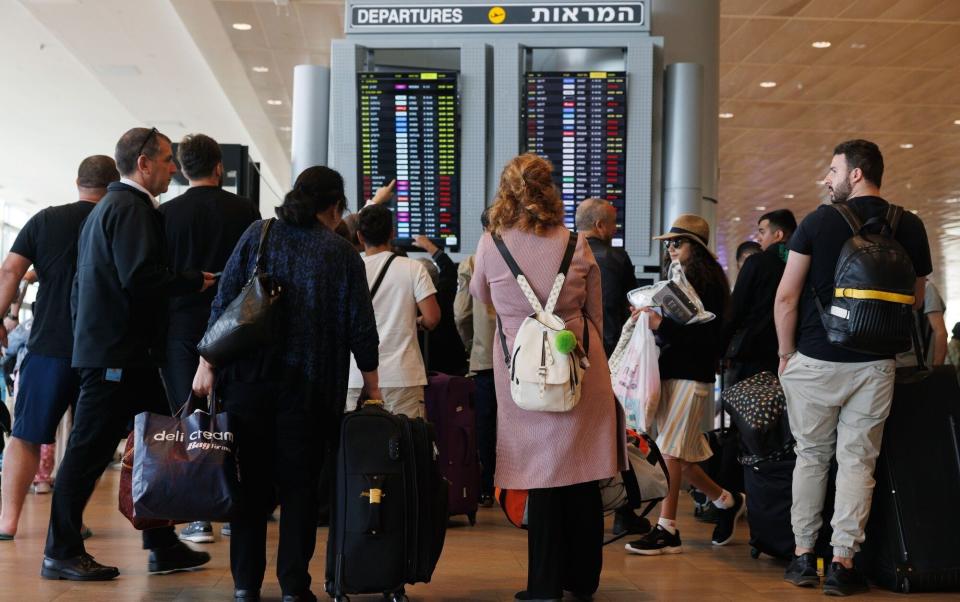How the Iran attacks could affect holidays – to the Middle East and beyond

British holidaymakers heading to the Middle East and as far away as Australia face travel disruption, after Iran carried out a major drone attack on Israel on April 13.
A number of airlines including easyJet, KLM and Wizz Air have temporarily cancelled flights to Tel Aviv in the wake of the attacks, and some long-haul operators have stopped flying over Iran, prompting lengthy detours.
Meanwhile, the Foreign, Commonwealth and Development Office (FCDO) has updated its travel advice to 16 countries – including Morocco, Egypt and the United Arab Emirates – after the April 13 attacks.
Here is everything you need to know about how Iran’s attack on Israel has affected aviation, with advice on travel to Morocco, Egypt, Dubai and Jordan, plus how the rising conflict in the Middle East has impacted long-haul travel routes.
What are the latest Foreign Office updates?
After the recent events in the Middle East, the FCDO has updated its travel advice to 16 countries. Travellers to Algeria, Bahrain, Egypt, Iraq, Jordan, Kuwait, Lebanon, Libya, Morocco, Oman, Qatar, Saudi Arabia, Syria, Tunisia, the United Arab Emirates and Yemen – some of which the FCDO already advises against visiting – have been urged to exercise additional caution.

The updated advice says: “On 13 April 2024 Iran carried out military action against Israel. Monitor this travel advice and other media as the situation is changing fast. Follow and contact FCDO travel on Twitter, Facebook and Instagram. You can also get email notifications when this travel advice is updated. Read FCDO advice on how to deal with a crisis overseas.”
However, the update does not affect any overarching, pre-existing travel advisory. The tourist areas of Egypt, Morocco and Dubai, for example, remain “green” on the FCDO’s advice pages.
How has travel to Israel been affected?
After Iran carried out its drone attack, Israel closed all airports in the country and its airspace. A number of neighbouring countries including Jordan, Iran, Lebanon and Iraq have also temporarily closed their airspace or heavily monitored air traffic.
The above countries have since reopened their airspaces, but easyJet has cancelled its flights to Israel in the wake of the attacks, just a month after resuming flights to Tel Aviv after the October 2023 attacks.
A spokesman said: “Due to the evolving situation in Israel, easyJet has taken the decision to temporarily pause operations to and from Tel Aviv until April 21.” EasyJet has contacted affected customers and says: “The safety and security of our passengers and crew is always easyJet’s highest priority.”
A spokesman for Wizz said: “Wizz Air confirms that it cancelled its flights to Tel Aviv on Sunday April 14 and Monday April 15, following the ongoing escalation in the region. The airline will resume flights as of Tuesday April 16; however, passengers may experience some schedule changes.” Wizz added that it is closely monitoring the situation, and all affected passengers will be provided with rebooking or refund options.
KLM told The Telegraph that it has also cancelled flights to Tel Aviv on Monday April 15.
Are adventure tours in Jordan still going ahead?
Iran already had an FCDO travel advisory in place, and Israel is either orange (non-essential travel is not advised) or red (all travel is not advised), but the adventure tour destination Jordan remains green in the eyes of the FCDO, with the exception of its border with Syria.
The adventure tour operator Explore told The Telegraph: “Our tours to Jordan are currently operating as usual, and we have groups travelling in-country at the moment. At the moment, the situation in Jordan remains calm and the Foreign Office advice has not changed – Jordan remains open to travel.
“We always have flexible booking conditions where we’ll look to swap customers’ departure date or trip, or offer a credit note, up to 10 days prior to departure, minus any irrecoverable costs. For anyone due to travel to Jordan in the next 10 days, we’re offering this flexibility up to the date of departure.”

The implications for long-haul travel
Due to existing airspace restrictions in the Middle East, airlines flying between Europe and Asia typically route via a narrow northerly corridor across Turkey and Azerbaijan, or via a southerly route above the Red Sea and Saudi Arabia.
However, following the events of April 13, some airlines are now re-routing away from Iranian airspace. A spokesman for Qantas told The Telegraph: “We’re temporarily adjusting the flight paths for our flights between Perth and London due to the situation in parts of the Middle East.”
Qantas is now operating its usually non-stop service from Perth to London with a stop-over in Singapore in order to keep carrying a full load of customers, although the return leg will continue non-stop due to prevailing winds. KLM is also giving the region a wide berth: “As a precaution, we do not fly over Iran and Israel,” a spokesman said, although they did not give a time limit for this measure.
However, some major airlines do continue to fly over Iran. A spokesman for Wizz told The Telegraph that it continues to fly over the country: “There are no restrictions in place; however, the airline is monitoring the situation on a 24/7 basis for any changes,” a spokesman said. Looking at the flight-tracking website Flightradar24 on Monday April 15, it is evident that a number of airlines continue to fly over the country.
Mark Zee, of Opsgroup, an organisation which monitors airspace and airports globally, says: “Several airlines are already flying over Iran again. Ultimately it comes down to each operator’s risk appetite.”
However, he adds: “The events of the weekend are not likely to create any significant or long-term routing issues. The only immediate impact will be a preference for operators to route via Egypt and Saudi Arabia instead of Turkey and Iran/Iraq for a Middle East transit. This is most relevant for long-haul operators between Europe and Asia.”

